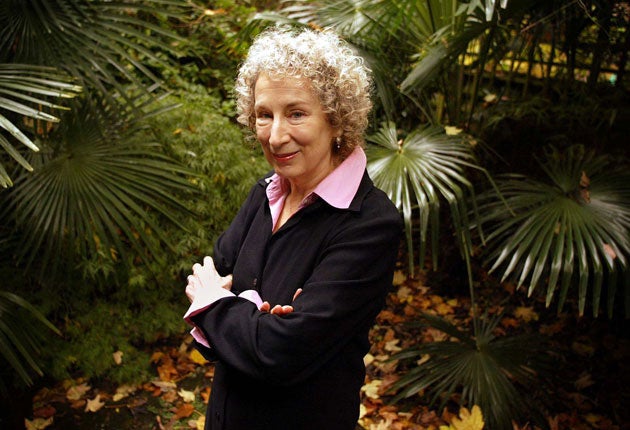Why Margaret Atwood’s defense of the word ‘woman’ is misguided – and why it’s so important to get it right
An author whose work challenges biological essentialism has staked out a place on the wrong side of the argument. People like me have long paid a dire price for this wrongheaded thinking

Earlier this week, award-winning author Margaret Atwood shared an op-ed titled “Why Can’t We Say ‘Woman’ Anymore?” with her two million followers on Twitter. The otherwise unremarkable Toronto Star essay, written by Rosie DiManno, that questions the use of inclusive terms in health care was thrust into the center of social media consciousness, in part thanks to the boost from the feminist author known for her work challenging sexist biological essentialism – not least her novel The Handmaid’s Tale.
DiManno’s op-ed claims that the term “woman” is in danger of eradication, and that inclusive language such as “person who menstruates” is a result of “trans activism run amok” – and that it’s aimed at erasing women as a group.
Some prominent voices, including award-winning author Amanda Jetté Knox and award-winning journalist Katelyn Burns, stepped up to debunk the essay on Twitter. Others besides have pointed out the irony of Atwood’s decision to align herself with the essay and its author, given the thesis of her major works.
Their main counterpoint is that referring to "people who menstruate" isn’t just inclusive, but accurate. Transgender men, nonbinary people, and people of any gendercan and do menstruate and get pregnant. At the same time, many cisgender women do not menstruate or become pregnant, for various reasons. We group people by their medical commonalities all the time – oncology patients, for instance. Thus, “people who menstruate” is a term meant to help us guide patients in need of care to their best resources.
After receiving pushback, Atwood delivered what appeared to be her best attempts at “clapbacks.” Ignoring the higher-profile authors and journalists responding to her, Atwood retweeted responses from accounts with fewer than 300 followers (remember, she has two million followers) to defend the author of the essay against the label “TERF”, cast doubt on whether people read the essay in question, and put the spotlight on the smaller accounts that dared question her.
Anti-trans sentiment is pervasive, and often, the proponents of this antagonistic stance are supposedly people who understand what it means to be marginalized based on gender. Atwood aside, we’ve lately heard a range of trans-exclusive takes from famous people like Rose McGowan, J.K. Rowling, Joyce Carol Oates, all of whom have used their platforms to influence how their followers, in many cases stretching into the millions, view trans and nonbinary people.
Meanwhile, trans and nonbinary people like me rarely have the kind of platform Atwood enjoys. And when we do—as we see with Elliot Page—we have to spend our time refuting anti-trans claims, raising awareness about and mourning the murders of trans people, and fighting for our basic rights. We’re too busy trying to stay alive to spend our time worrying about cisgender people. Why are they so concerned with us?
The behavior of Atwood and her famous fellow travelers raises serious questions of responsibility. What do public figures with major platforms owe their audiences when they engage in public discourse? Is it really responsible for people like Atwood and Rowling to use their massive platforms to target a disenfranchised, marginalized group that experiences violence at alarming rates?
Then there’s the glaring power differential at work. Is Atwood somehow “erased” by terms that address actual medical needs? What potential harm does she face if trans people are more included in medical language – and by contrast, what potential harm awaits trans people if we are excluded?
To put it bluntly, hate-fueled medical negligence kills trans people. In 1995, Tyra Hunter was seriously injured in a car accident and then found herself jeered at and refused treatment by ambulance workers because she was trans; she later died from her wounds. Robert Eads was denied treatment by 20 doctors before dying of ovarian cancer in 1999. One doctor suggested that the diagnosis should make Eads “deal with the fact that he is not a real man.”
It might be tempting to see these as outliers from a bygone era, but according to The National Transgender Discrimination Survey, 19 per cent of respondents reported “being refused care outright because they were transgender or gender non-conforming.” Many more experienced other forms of discrimination, discrimination that can in part be countered with inclusive language.
At a time when anti-trans violence is on the rise in the US, famous feminists with large platforms wield meaningful influence over the lived realities of trans people. To pretend otherwise isn’t just foolish, it’s dangerous. And when figures like Atwood use their platforms to hurt, denigrate and dismiss trans people, they keep us in a holding pattern where the conversation never actually moves forward.
Rather than seeing us for all our complexity and beauty and power, we’re seen as a menace making life harder for “normal” people. I’m sick of being defined by people outside of our group, by their perceptions of – and sometimes, sick pleasure in – our suffering.
Trans people experience so much more than pain. We experience joy and freedom beyond the grasp of cisgender people. We see the universe in its full glory and revel in it, not because it meets our expectations of what it should be, but because as we do with ourselves, we embrace the mutability, the unknowability, the unruly nature of what it means to live.
Sometimes I wonder if Atwood and her kin try to strip away our humanity because they are jealous of how free we are. I wouldn’t know. I’m too busy being free.

Join our commenting forum
Join thought-provoking conversations, follow other Independent readers and see their replies